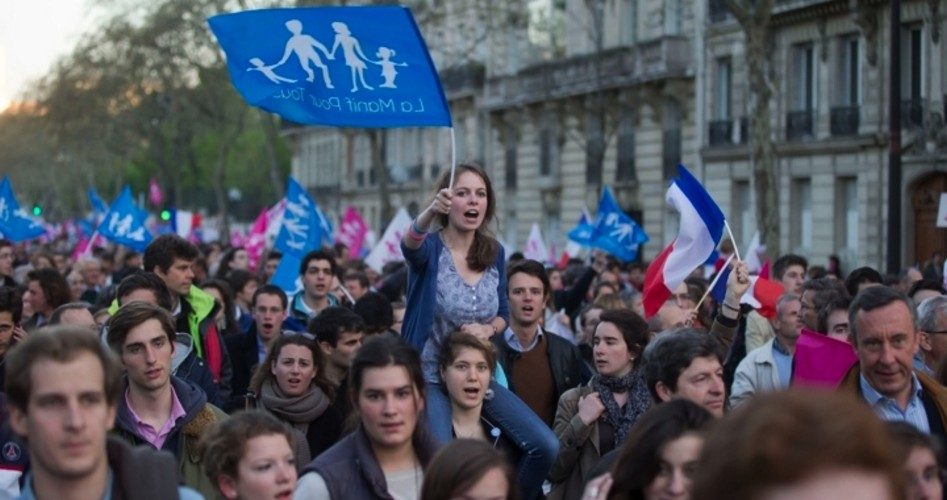
While the French government may have forced legalized same-sex marriage on its subjects with a final vote by the National Assembly on April 23, a strong voice among French citizens continues to be raised in aggressive opposition. France became the 14th country to redefine marriage, with the 335-221 vote in the socialist-controlled National Assembly coming a week after New Zealand voted to legalize homosexual relationships as marriage.
But the change in the traditionally liberal nation has not come without intense opposition by a broad range of both secular and religious groups, with even some homosexual organizations declaring that true marriage can exist only between a man and a woman. In January an estimated half-million French citizens took to the streets of Paris to protest the same-sex marriage plan spearheaded by Socialist President Francois Hollande. Most were demanding that French voters be allowed the final decision in the form of a national referendum.
And just days before the vote, over 50,000 protesters joined in a massive show of resistance outside the National Assembly building, demanding a referendum and chanting, “We don’t want your law, Hollande.” Alberic Dumon, one of the protest organizers, told Reuters News: “We warned the president back in November that we would not give up and that we would do everything to stop this law being passed, or to get it repealed if it is adopted.
Cardinal Andre Vingt-Trois, the Archbishop of Paris, warned that the way the French government had forced same-sex marriage on the country without debate or input from citizens was likely to incite continued resistance and even violence. He noted that the difference between the sexes was a basic human trait and denying it by forcing the legalization of same-sex marriage would severely compromise a peaceful solution. “This is the way a violent society develops,” he told a recent meeting of French bishops. “Society has lost its capacity of integration and especially its ability to blend differences in a common project.”
Frigide Barjot, the French comedienne who has been a leading secular voice against same-sex marriage, said that opponents of the measure included Christians, Muslims, atheists, and even homosexuals, many of whom had no problem with France’s civil union law that allowed same-sex partnerships, but who viewed legalized same-sex marriage as destructive of French society. “We’re all born of a man and a woman, but the law will say the opposite tomorrow,” warned Barjot before the vote. “It will say a child is born of a man and a man.” Barjot vowed that “we are going to show them this is not over. I solemnly ask the president to hold a referendum on the subject.”
The Associated Press reported that “legions of police” were forced to deal with protests that turned violent following the vote, with Barjot insisting that it was merely a response to the way the law was forcibly imposed by France’s parliament. The AP quoted one protester, a mother of two, as saying that like others, she would “oppose the bill until the end…. The bill is not effective yet; the president of the Republic must listen to our voices. We are here to defend family values. Children need a mom and a dad.”
At least one group was less violent — but just as resolute — in its opposition to the new law. The Catholic News Agency (CNA) reported that nearly 15,000 French mayors — organized as Mayors for Children — have said that they will refuse to perform same-sex marriage ceremonies as the law prescribes. Before the final vote Franck Meyer, a spokesman for the organization, said that while some of the mayors would most likely resign their positions under the new law, others would simply refuse to comply. “As citizens, we elected officials will not give up,” he said in a statement to the media.
One of the most surprising voices of opposition has come from France’s homosexual community. In January, Nathalie de Williencourt, a lesbian and founder of one of France’s largest homosexual groups, said that a majority of gays and lesbians in the country do not want legalized same-sex marriage or the right to adopt children. “I am French, I am homosexual,” Williencourt said, as quoted by CNA. “The majority of homosexuals do not want either marriage or adoption, and we especially don’t want to be treated the same as heterosexuals because we are different. We don’t want equality, but we do want justice.”
Photo of activists protesting same-sex marriage in Paris April 23: AP Images

